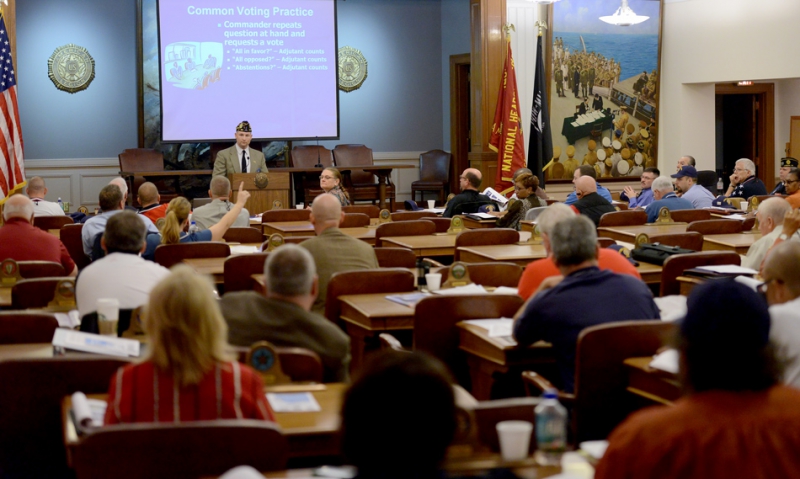
Mentorship increases Legion volunteerism, retention
Since Monday, the 57 Legionnaires attending National Legion College in Indianapolis at American Legion National Headquarters have been learning about the value of mentorship in the Legion. They have watched videos on mentorship, received handouts and listened to presenters talk about mentors in their life.
After showing a video clip of former NFL and NBA stars, such as Ahmad Rashad, Charles Barkley and George Gervin discussing their mentors, Wisconsin Legionnaire Mike Rohan gave a presentation to the students, stressing that mentorship should not be confused with coaching. Rohan said that the group of former athletes often confused these two concepts, and that Barkley is the only one who understands that difference because he was taught by his mentor – his grandmother – to work hard and treat people with respect. The other athletes discussed mentoring in terms of athletic achievement, whereas Barkley’s mentor taught him to excel as a person.
When he was on active duty and a member of the Legion with little involvement, Rohan's mentor was a “crusty old World War II veteran,” he said. One day, the World War II veteran (Jim) told Rohan that he had personally written a resolution that he wanted Rohan to present as his own. Rohan presented it and received a contentious response from the older Legionnaires at the post, who told him to sit down and return when he was older. Rohan told the World War II veteran that he could not present the resolution because the Legionnaires said he was too young. The veteran told Rohan that this was a test, which he failed.
“Jim told me, ‘I gave you that piece of paper because I wanted to see if you were cut out for The American Legion. It looks like you are a quitter and we don’t need that here,'" Rohan said. "Normally that isn’t a good way of mentoring someone, to call them a quitter, but it worked for me because that is my personality, and he recognized that.”
Rohan suggested that a good starting point for mentorship in The American Legion would be to identify a Legionnaire, at any level, who needs a mentor and begin sharing the many resources which the Legion has with that individual. "All of you share a common bond of service, which is a natural starting point for mentorship," he said. “In The American Legion, we have something unique because we have all served. From the very start we all have something in common. That allows you to become a mentor so much easier than these basketball or football stars.”
During his presentation on mentorship, Department of Texas Adjutant Bill West said his mentors taught him to never judge a book by its cover, never quit, never give up and never let anyone stand in your way. "To accelerate the transfer of knowledge is what mentorship is," West said to the students. "With mentoring you have to have trust, you have to give encouragement, and you have to give words of advice."West asked the students to be the first Legionnaire that welcomes a new member into their posts, then gradually give them a task and an assignment, making them feel a part of the organization. "Mentoring does increase volunteerism and retention," he said.
Oftentimes, Legionnaires mentor others without even realizing it, West said, which happened to Donna Stacey of Post 44 in Alabama.
"I met a woman veteran and asked her to get involved with the Legion. She later came back to me and told me she was the post commander because of the encouragement I gave her," Stacey said. "Now, I continue to encourage her and make sure she has all the resources she needs to do her job as post commander."
In addition to learning about mentorship, the Legion College students heard presentations on how to write a resolution, access and utilize mylegion.org, and run a district meeting. The students have been working on writing a resolution within their assigned groups, but they were tasked with another assignment Wednesday morning – to create a motto for next year's Legion College class about who the Legion is.
Tomorrow, the students will present their resolutions, discuss the roles of a post commander and adjutant, and take a 50-question test on The American Legion.
